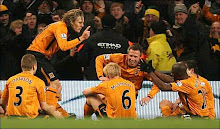
If anyone's role in Hull City's exceptional start to Premier League life has been hard to pigeonhole, it's that of George Boateng.
The very fact that we're only just featuring him now, despite his status as a crux of the team, showcases this to an extent, although it's an obvious time to examine his contribution thus far as his old club hovers into view this weekend. He has been effective and influential in as quiet and dignified a way as possible.
This is especially the case since Phil Brown decided to deploy the 4-3-3 at Arsenal and then keep it. Boateng is part of a three-man midfield. Ian Ashbee is the stopper, Dean Marney the energetic creator and supporter. This makes them easier to spot, track and critique. Boateng lies in between, frequently being around to join in attacks but simultaneously making sure he is in a position to hurry back for defensive duties when the occasion demands. A lot of this work is done off the ball, thereby the eyes are on him less.
Boateng is, basically, the glue that keeps this side together. His experience, awareness and cool demeanour has been a boon and godsend, especially when forming one third of a midfield which comprises of two-thirds Premier League beginners.
It's probably Ashbee who has benefitted most directly from Boateng. The skipper is flying into unwinnable tackles less as he knows that Boateng is often in a better position to make said tackle completable, leaving him with less inclination to jump first, think later.
Boateng was heralded as a good signing by Brown when he joined from Middlesbrough, without making supporters throw their caps aloft. As a known destructor and leader, questions were asked as to whether he would either a) replace Ashbee, finally giving Brown the opprtunity to say he had a better alternative than his captain on the payroll; or b) partner him, leaving open the door of accusation that City were going to be stoic and negative in the middle of the park. The latter option meant that Marney's future in particular was called into question. Nobody, back in the summer, considered that a 4-3-3 was ultimately in the offing, allowing Boateng and Ashbee to play alongside each other while still finding room for a creative source in Marney. This trio has worked fantastically together.
It's already a decent bet that Boateng will never score for Hull City, as he doesn't get into Marney-esque shooting positions and isn't in the penalty area like Ashbee when a set-piece swerves in. None of the fabled trio have scored yet, in fact, but I can't recall Boateng having a single shot. This doesn't hugely matter, of course, and his goalscoring record over a decade of Premier League action isn't anything to write back to the Netherlands about. But on the ball, he is calm and solid, using it diligently and carefully, rarely wasting possession and never panicking, while occasionally looking up to play something exceptional, such as the fine instep pass which freed Bernard Mendy to lob in his goal at Manchester United.
It's the influence, the effect on others, that makes Boateng stand out, albeit it may be something that only clatters you between the eyes if you find yourself deliberately watching him play. Boateng has been a quiet revelation, happy to let Geovanni and Marlon King hog the headlines while doing a considered and sturdy job in the middle. For as much as he appears peripheral at first, he has been as pivotal a participant in City's rise to international acclaim as any more obvious figures, and he shall want to prove that ever more to the club prepared to let him go for a bargain £1million when they visit the KC this weekend.



.jpg)






